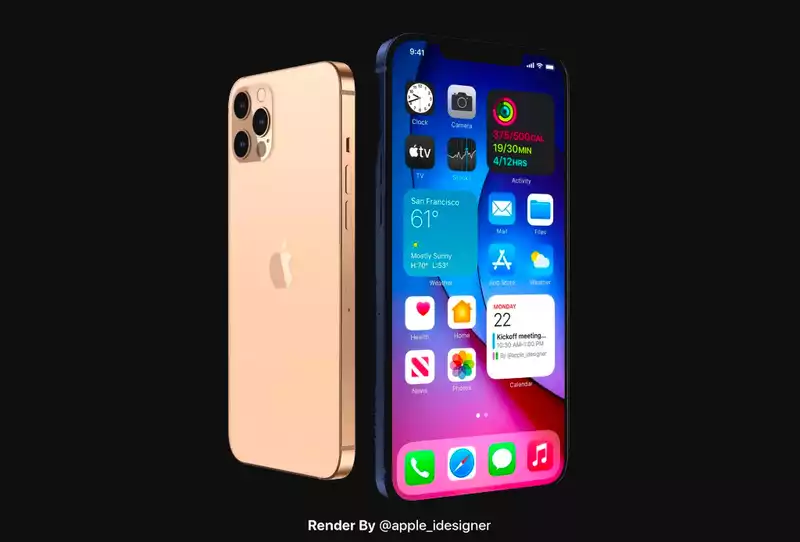The iPhone 12, despite being Apple's flagship model, very likely will not feature a 120Hz refresh rate
In "Will-they, won't-they," which had more twists and turns than the plot of Rachel and Ross in "Friends," rumors and leaks swirled that the iPhone 12 would feature a high refresh rate display And now, the latest rumors claim that all four models will feature 60Hz screens, even though the iPhone 12 will likely be delayed from its usual September release and announced in October
And if this rumor comes true, I will be disappointed Sticking to a 60Hz display when other phones, even mid-range phones, are using higher refresh rates seems like a strange move from a company as smart as Apple The reasons for this are as follows
Apple has so far followed its own path when it comes to smartphones In the past, the iPhone took a long time to move from single-core to dual-core and multi-core chips And while Android phones continue to expand their displays, Apple has played it safe and made small changes to the display size of its phones rather than suddenly releasing a large screen phone
It has generally been believed that Apple may not be the first to market, but once they get started, they will introduce phone features in the best way possible At least I feel that was the case until the iPhone X
As great as the iPhone X was, the rise of the punch-hole selfie camera and slimmed-down teardrop notch quickly made the display notch look a bit old-fashioned Sure, the iPhone 11's chunky display notch features advanced Face ID scanning technology, but other models now have secure and responsive facial recognition capabilities
Apple has done well with camera fonts, but the iPhone 11 Pro's triple-camera array feels like a response to the clutch of rear-facing cameras that Android phones began touting in 2018 and 2019 iPhone 11 Pro takes great photos, there's There's no denying it But the phone itself tells us that Apple appears to be following rather than leading Android flagship devices with the iPhone
And the iPhone 12 will not have a 120Hz display, which seems to be more the case than ever
My current daily phone is the Oppo Find X2 Pro, which has a silly name but great specs Its best feature is its super-smooth 120Hz display, and it has a small punch-hole selfie camera in the upper left corner, which keeps the screen area large
I switched to the Find X2 Pro from a Samsung Galaxy Note 10 Plus with a 60Hz display, and while I can't say that a 120Hz display is essential for daily phone use, it's really nice Everything feels incredibly snappy, especially when using gesture controls instead of virtual buttons
I'm not going to buy a phone just for a display with a high refresh rate, but I feel it should be a must for flagship phones in 2020: the Galaxy S20 has a 120Hz display, the Samsung Galaxy Note 20 Ultra and OnePlus 8 Pro are similar
High refresh rate displays do not even have to be a flagship phone feature The mid-range OnePlus Nord has a 90 Hz display, a noticeable upgrade from 60 Hz
So the idea that the flagship iPhone 12 won't have a 120Hz or even 90Hz display seems a bit silly to me
Apple always demands a premium price for its iPhones, with the exception of the iPhone SE 2020 Some Android phones have caught up to Apple's higher iPhone prices, but they still charge higher prices for phones with specs that are competitive with cheaper Android phones
This has been true for some time But the lack of 120Hz displays may be the point where paying Apple's premium really starts to stick in the throat
Again, it's not a must-have feature, and one could argue that the average Apple fan doesn't care about screen refresh rates
However, consumers are becoming increasingly tech-savvy, and some may begin to ask why they should spend $800 to $1,000 to upgrade from the iPhone X or iPhone 11 to the iPhone 12
While the iPhone 12 is expected to offer faster performance and better photography, it is unlikely that many iPhone X owners will notice a significant difference from the iPhone 12 in everyday use
Cameras in modern phones are so good that upgrades from generation to generation are only really noticed by those who go looking for incremental improvements Also, given how optimized iOS and the iPhone are, unless you are a heavy gamer, iPhone X users may not feel the faster chip [However, the jump from 60Hz to 120Hz is a serious upgrade, and once you try it, it's hard to go back So, if you can't get a higher refresh rate, there is some debate as to why you should upgrade to the iPhone 12 over blind Apple loyalty
And even Apple loyalists might raise an eyebrow at buying a phone that looks a little smarter but offers no realistic improvement over their current phone Especially when people are becoming more environmentally conscious and the economy is suffering from a recession due to the coronavirus pandemic
I'm still hoping that by delaying the iPhone 12 announcement by a month or so, Apple has figured out a way to add a 120Hz display to the iPhone 12 Pro However, the rumors so far are not hopeful
There is no doubt that Apple will sell millions of iPhone 12 devices But if it doesn't have a 120 Hz display, I certainly won't buy one And I would be disappointed that Apple did not delay the iPhone 12 further to include a display that would reach 2020 standards










Comments